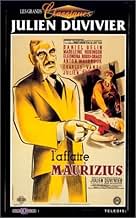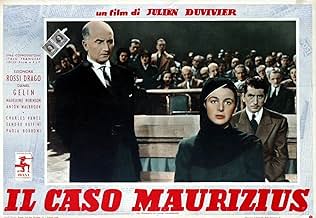In this legal drama, told in flashbacks, the son of a judge, who had sentenced a man who may be innocent to 17 years in prison, tries to investigate the mysterious case.In this legal drama, told in flashbacks, the son of a judge, who had sentenced a man who may be innocent to 17 years in prison, tries to investigate the mysterious case.In this legal drama, told in flashbacks, the son of a judge, who had sentenced a man who may be innocent to 17 years in prison, tries to investigate the mysterious case.
- Director
- Writers
- Stars
- Awards
- 1 win total
Eleonora Rossi Drago
- Anna Jahn
- (as Eleonara Rossi-Drago)
Berthe Bovy
- La grand-mère
- (as Berthe Bovy de la Comédie Française)
Denis d'Inès
- Pierre-Paul Maurizius
- (as Denis D'Ines de la Comédie Française)
Palau
- Le conseiller
- (as Pierre Palau)
- Director
- Writers
- All cast & crew
- Production, box office & more at IMDbPro
Featured reviews
Even the most enthusiastic devotee of the prolific Julien Duvivier would probably concede that his post 1930's films are a mixed bag. Whereas 'Panique' in 1946 and 'Voici les temps des assassins' ten years later are undisputed masterpieces the others are those of a 'craftsman'.
The theme of 'L'Affaire Maurizius' is injustice.
Thanks to the efforts of his crusading, idealistic son, Charles Vanel as Wolf Andergast is forced to review an eighteen year old case in which as a deputy prosecutor he successfully condemned a man to Life imprisonment.The case turns out to be not quite as clear-cut as it seemed.
Vanel is as always superb. Daniel Gelin arouses our sympathy as the wrongfully accused man; Madeleine Robinson does well in a thankless part as a jealous wife and Anton Walbrook is outrageous but mesmerising as a seedy, drunken voluptuary. There is an excellent turn by Jaques Varennes as the examining magistrate. The only weak link is the Anna of Eleanora Rossi-Drago. Her character is so colourless and sexless that one cannot imagine her causing the havoc that she does.
This is a bizarre, cynical and deeply pessimistic melodrama that will nonetheless keep you absorbed, the ending of which really packs a punch.
Julien Duvivier must be one of the unsung heroes of French cinema; I have now seen 5 or 6 films made by him, and I've liked or loved each and every one of them. "L' Affaire Maurizius", one of his least-known efforts, is an engaging whodunit, with some social commentary added; the flashbacks, and sometimes flashbacks-within-flashbacks, are particularly well-handled. Leonard Maltin gives it two stars, but lists the running time as 70 minutes; my copy ran about 105 minutes, so it's safe to say he saw a very edited-down version. I give mine an easy *** out of 4.
10clanciai
This is one of the most complicated murder cases ever screened, the story is overwhelming in complexities, and what seems to be an easy and self-evident beginning, soon winds itself into an inextricable labyrinth, in which everyone is misled to gross mistakes except the one man who knows and maybe is responsible for it all, the mysterious character of Doktor Warschauer, a pathetic remnant of a once brilliant ace of culture, theatre and learning, reduced to a hopeless remorseful drunk, who doesn't care about anything any more but who is the only one who knows the entire truth although he has perjured himself for it, and he prroduces the very weird definition of justice in the most famous scene of the film, when he confides in his young student (learning English from him) in Lucerne with two ballerinas dancing gaily in the background - a typical Julien Duvivier grotesque but ingenious arrangement. Because of one victim, they are all victims in this, and although there might be some hope after all, the hoplelessly desperate face of Mr Maurizius in tears vanishing in the darkness is the final signature of the film. This is perhaps Anton Walbrook's most interesting and prominent performance, seconded well by the totally matter-of-fact and unsentimental Charles Vanel in his most consistently objective role - his poker face conceals any abysses of regrets and hard experience, maybe also of intolerable lessons, but he lets absolutely nothing out. Eleonora Rossi Drago plays the most important female part, and although her part is small, she turns the tables more than once. It's an excruciating labyrinthal odyssey in the hopeless Kafkaesque nightmare of the entrapment of court procedures, (the author Jacob Wassermann of Vienna, 1873-1934, was himself a Jew,) but Julien Duvivier as usual controls everything with the accomplished hand of a perfect master.
A chance remark by a teacher leads Jacques Chabassol to investigate the case that brought his father, Charles Vanel, to prominence twenty years earlier.
It's another strong movie from Julien Duvivier in which he explores what is now fairly full blown film noir, in a world filled with femmes fatales trapped by men's lusts, prisons in which only the shadows of bars can be seen,bourgeoise Swiss justice a matter of francs and centimes, and the the only way out of prison for Daniel Gélin after eighteen years for a murder he may not have committed...
If it's not film noir, it's very dark magical realism about how there is no repairing the past. With strong and outrageous performances by Madeleine Robinson, and a sometimes heavily bearded Anton Walbrook.
It's another strong movie from Julien Duvivier in which he explores what is now fairly full blown film noir, in a world filled with femmes fatales trapped by men's lusts, prisons in which only the shadows of bars can be seen,bourgeoise Swiss justice a matter of francs and centimes, and the the only way out of prison for Daniel Gélin after eighteen years for a murder he may not have committed...
If it's not film noir, it's very dark magical realism about how there is no repairing the past. With strong and outrageous performances by Madeleine Robinson, and a sometimes heavily bearded Anton Walbrook.
At first sight,Duvivier seems to follow in André Cayatte's footsteps.At the time,the latter director had launched a crusade against all the miscarriages of justice and had begun to champion any good cause going.But further acquaintance shows this:"l'affaire Maurizius" is a Duvivier movie .In Cayatte's movies,the problems are finally generally solved: in "Nous Sommes Tous Des Assassins" ,René was granted a pardon,in "Les Risques du Métier" ,the schoolteacher was rehabilitated.Even when the story turns black ("Le Glaive et la Balance" or "Justice est Faite") ,Cayatte " manages to limit the damage" so to speak.One should note that the young lead ,Jacques Chabassol,was part of Cayatte's "Avant le Deluge" (1953).
In "l'Affaire Maurizius",no one was saved:the judge has lost his son who is ashamed of his father ,the son has lost all his illusions,the gorgeous reluctant femme fatale has turned into a prematurely aged lady,her former lover is now living on the fringes of society,and the chastised innocent ......his fate is sealed as soon as the film begins...
....because,when the movie begins,"L'Affaire Maurizius" is an old one everybody wants to forget.That an innocent man may have spent seventeen years in jail does not seem to move the bourgeois judge (Charles Vanel),jealous of his privileges.Little by little,through flashbacks,scenes of the past resurfaces again .The judge 's son believes in justice and wants to save the prisoner(Daniel Gélin)who was "burried alive" .But Waremme (Anton Walbrook) tries to explain to him that the society scoffs at the law:while he is talking to the desperate young man,two dancers appear as shadow graphs on the window.This is the key to the film and to Duvivier's black world.
"L'Affaire Maurizius" is wrapped in mystery: all the flashbacks are filmed in places which seem secret and where a danger seems impending.The film sets are bare when they depict the past,emphasizing the characters who,unfortunately,with the exception of Vanel,sometimes display a tendency to overact.This misty atmosphere will emerge again in later works such as "Marianne de Ma Jeunesse" or "La Chambre Ardente".
Some objections to "l'Affaire Maurizius" remain: overacting (Anton Walbrook verges on ridicule),and Madeleine Robinson's underwritten part:she barely appears ten minutes whereas she plays a pivotal role in the screenplay.Her relationship with her younger sister (Eleonora Rossi-Drago) is only skimmed over whereas it is essential to the plot.
However,like almost all the movies Duvivier made ,it is a must: his pessimism leaves the viewer no hope : the last scene could be subtitled "out of the blue ... and into the black ,they give you this but you pay for that,and once you're gone you can never come back.." (Neil Young)
In "l'Affaire Maurizius",no one was saved:the judge has lost his son who is ashamed of his father ,the son has lost all his illusions,the gorgeous reluctant femme fatale has turned into a prematurely aged lady,her former lover is now living on the fringes of society,and the chastised innocent ......his fate is sealed as soon as the film begins...
....because,when the movie begins,"L'Affaire Maurizius" is an old one everybody wants to forget.That an innocent man may have spent seventeen years in jail does not seem to move the bourgeois judge (Charles Vanel),jealous of his privileges.Little by little,through flashbacks,scenes of the past resurfaces again .The judge 's son believes in justice and wants to save the prisoner(Daniel Gélin)who was "burried alive" .But Waremme (Anton Walbrook) tries to explain to him that the society scoffs at the law:while he is talking to the desperate young man,two dancers appear as shadow graphs on the window.This is the key to the film and to Duvivier's black world.
"L'Affaire Maurizius" is wrapped in mystery: all the flashbacks are filmed in places which seem secret and where a danger seems impending.The film sets are bare when they depict the past,emphasizing the characters who,unfortunately,with the exception of Vanel,sometimes display a tendency to overact.This misty atmosphere will emerge again in later works such as "Marianne de Ma Jeunesse" or "La Chambre Ardente".
Some objections to "l'Affaire Maurizius" remain: overacting (Anton Walbrook verges on ridicule),and Madeleine Robinson's underwritten part:she barely appears ten minutes whereas she plays a pivotal role in the screenplay.Her relationship with her younger sister (Eleonora Rossi-Drago) is only skimmed over whereas it is essential to the plot.
However,like almost all the movies Duvivier made ,it is a must: his pessimism leaves the viewer no hope : the last scene could be subtitled "out of the blue ... and into the black ,they give you this but you pay for that,and once you're gone you can never come back.." (Neil Young)
Details
- Release date
- Countries of origin
- Languages
- Also known as
- On Trial
- Filming locations
- Junkerngasse, Bern, Kanton Bern, Switzerland(exteriors: Andergast's home)
- Production companies
- See more company credits at IMDbPro
- Runtime1 hour 50 minutes
- Color
- Sound mix
- Aspect ratio
- 1.37 : 1
Contribute to this page
Suggest an edit or add missing content
































